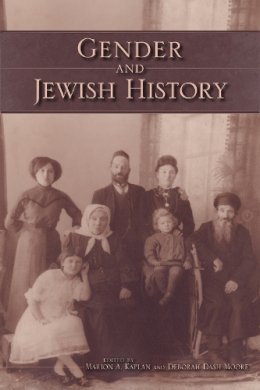9%OFF
Stock image for illustration purposes only - book cover, edition or condition may vary.
Gender and Jewish History (The Modern Jewish Experience)
Marion Kaplan
FREE Delivery in Ireland
Description for Gender and Jewish History (The Modern Jewish Experience)
Paperback. Gender's critical importance to understanding Jewish history Editor(s): Kaplan, Marion A.; Moore, Deborah Dash. Series: The Modern Jewish Experience. Num Pages: 428 pages, 13 b&w illus. BIC Classification: HBTB; JFSJ; JFSR1. Category: (P) Professional & Vocational. Dimension: 229 x 153 x 25. Weight in Grams: 586.
By revealing the importance of gender in interpreting the Jewish past, this collection of original essays highlights the profound influence that feminist scholarship has had on the study of Jewish history since the 1970s. Gender and Jewish History considers the impact of gender on Jewish religious practices and political behavior, educational accomplishments and communal structures, acculturation and choice of occupations. The book stimulates conversations on such topics as Jewish women's creativity and spirituality, violence against women, Jews' reactions to persecution in the Holocaust, and Judaism as lived religion and culture. Honoring Paula Hyman, one of the founders of Jewish gender ... Read morestudies, this volume shows gender to be an eye-opening entry into realms of Jewish history previously untouched by it.
Show Less
Product Details
Publisher
Indiana University Press
Series
The Modern Jewish Experience
Place of Publication
Bloomington, IN, United States
Shipping Time
Usually ships in 7 to 11 working days
About Marion Kaplan
Marion A. Kaplan is Skirball Professor of Modern Jewish History at New York University. Deborah Dash Moore is Frederick G. L. Huetwell Professor of History and director of the Jean and Samuel Frankel Center for Judaic Studies at the University of Michigan.
Reviews for Gender and Jewish History (The Modern Jewish Experience)
[T]he subject matter of the essays shows how gender analysis can and should belong in a variety of fields and areas of study, from religious thought to the history of art to activism and politics. The result is a fitting tribute to one of the great historians of modern Judaism.
Religious Studies Review
Written by authorities in their ... Read morefields, these essays are nevertheless accessible and uncover many previously hidden aspects of social, cultural, religious, and political Jewish life since the mid-18th century. Fall 2011
Jewish Book World
Gender and Jewish History will ultimately be valuable to both scholars and graduate students in a number of disciplines. Although these essays did not arise out of a conference, they nevertheless engage in dialogue with one another to a remarkable degree.
Studies in Contemporary Jewry
Owing to the calibre of its scholarship and the fact that it brings together important work by scholars of European and American Jewish history, literature, culture, religious studies, and Holocaust studies, this book is unquestionably the most significant volume on the topic to appear in English in over a decade.11.3 2012
Journal of Modern Jewish Studies
[T]he incredible breadth of essays in Gender and Jewish History proves that few topics in modern Jewish history can be understood without paying attention to gender, as a set of relationships that structure power.
The Jewish Quarterly Review
Imagine sitting down for delicious tapas at a long table with a group of old friends. The flavors are nuanced and varied, while the conversation is lively, provocative and deeply engaging. Reading Gender and Jewish History, edited by noted historians Marion A. Kaplan and Deborah Dash Moore, is a bit like that imagined leisurely meal.
Jewish Daily Forward
Marion A. Kaplan and Deborah Dash Moore have created a worthy tribute to Hyman's pioneering role in establishing gender as an essential component in the scholarly interpretation of the Jewish experience.
H-Judaic
Gender and Jewish History makes an important contribution to our understanding in three ways. First, it gathers together eminent and emerging scholars in one comprehensive collection. Second, its essays are engaging and wide-ranging in focus, depth and breadth, and accessibly written, without dense academic jargon, so that nonacademics can dig in, as well. Finally, it's a moving testament to just how much an individual can influence the development and trajectory of an entire scholarly field through persistence, persuasion and extraordinary vision.
ForeWord
Show Less

